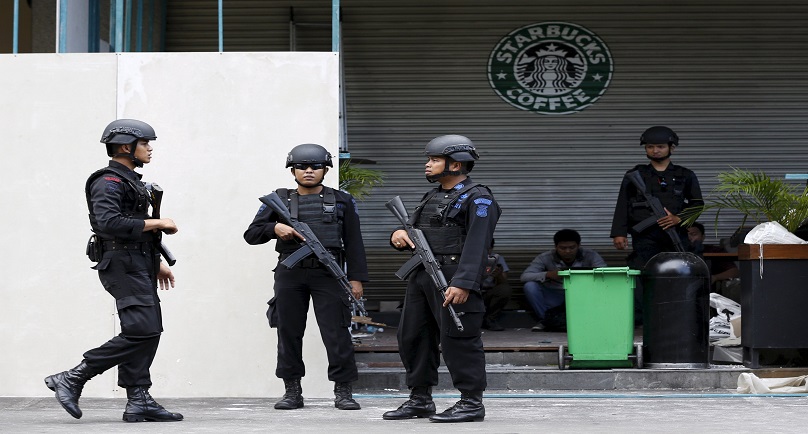Image:Indonesian police stand guard at the site of a militant attack in central Jakarta, Indonesia in this January 16, 2016 file photo. REUTERS/Darren Whit’side/Files
By Randy Fabi and Kanupriya Kapoor
JAKARTA (Reuters) – As Indonesian counter-terrorism forces hunt down supporters of Islamic State following last month’s gun and suicide bomb attack in Jakarta, a quiet resurgence is unfolding of a homegrown radical network with a far deadlier track record here.
That group is Jemaah Islamiyah (JI), whose network was until recently thought to have been severely degraded by a crackdown that put hundreds of its leaders and followers behind bars after a series of attacks on Western interests in the 2000s.
But Reuters interviews with two active and one former member of Jemaah Islamiyah have revealed that it is active again, enlisting new supporters, raising funds and sending men to train in war-torn Syria.
“JI is currently in preparation level. They have not done any operations but they are recruiting people, strengthening their knowledge, education, network and finances,” said Nasir Abas, a former member. “I would not underestimate them.”
Jakarta-based security analyst Sidney Jones believes Jemaah Islamiyah’s membership is back to around 2,000, where it was before its most notorious attack, a bombing on the resort island of Bali that killed over 200 people, most of them Australians. JI suspects arrested recently were found with caches of arms.
Experts say there is no evidence that the emergence of the ultra-violent group Islamic State from the crucible of conflict in the Middle East has prompted the revival of Jemaah Islamiyah in Indonesia, the world’s most populous Muslim nation.
Jemaah Islamiyah had links in the past to al-Qaeda, which Islamic State sees as a rival, but its resurgence is not being read as intra-jihadi competition playing out in Southeast Asia.
ORGANISED AND WELL FUNDED
Islamic State stamped its presence in the region for the first time last month when local supporters of the group launched a broad-daylight assault at a busy intersection in central Jakarta with explosives and guns. Eight people were killed, four of them the attackers themselves.
Police are on alert for further strikes by Islamic State followers, but say these are likely to be far from the scale of the attack on Paris last November because the group lacks organisational strength in Indonesia.
They believe Jemaah Islamiyah’s sophisticated training, organisation, and funding could pose a bigger security threat.
Former Jemaah Islamiyah member Nasir Abas said its ranks still include older men who trained in Afghanistan in the 1980s and returned with combat experience and bomb-making skills.
Then there is the more ample funding: Experts estimate that the weapons used in last month’s attack on the Indonesian capital cost no more than $70, a shoestring budget compared to the $50,000 spent to launch the Bali bombings back in 2002.
Jemaah Islamiyah once had cells across Southeast Asia, including Malaysia, the Philippines and Thailand, with a goal of establishing an Islamic state across the region.
Current members say it is no longer transnational and is focused on Indonesia, where its strategy is to win public backing for its ideology and ambition.
“We must be peaceful up to a certain point, otherwise how will we win public support?” Abu Rusydan, whom many believe to be its current leader, told Reuters by telephone. “If the Indonesian government can understand our message through words then we don’t need to carry out (attacks like) the Bali bombing.
When asked why Jemaah Islamiyah was sending men to Syria, Abu Rusydan said it was “to provide humanitarian services”.
“IN IT FOR THE LONG HAUL”
Changes to Indonesia’s anti-terrorism law, which would give police more power to detain suspects pre-emptively and prohibit Indonesians from joining overseas militant organisations, are under consideration following last month’s attack.
A Jakarta court last week jailed seven men accused of having links to Islamic State.
Among several suspected militants rounded up by police since December were four Jemaah Islamiyah-linked men who were found with bomb-making materials, guns and books on waging jihad.
But senior security sources say monitoring the activities of Jemaah Islamiyah members is difficult because much of the group went underground after key figures were arrested.
One source said that, like Islamic State supporters, Jemaah Islamiyah members use social media such as the messaging app Telegram but tracking them is harder.
And, legally, little can be done to stop the recruitment and education campaign underway in parts of Indonesia’s most populous island Java.
Abu Rusydan, who spent 3-1/2 years in prison for his role in the Bali bombings, lives openly in Central Java where he leads prayers and sermons at his neighbourhood mosque.
Taufik Andrie, who works with a deradicalisation non-governmental organisation in Jakarta, says Jemaah Islamiyah is in for the long haul, recruiting very smart and patient people.
“They are very careful about not pushing their members to get involved in small violent actions,” he said.
Analyst Jones believes they are unlikely to mount a major attack any time soon as it could lose them community support.
“They believe deeply they have to be ready … once the political situation becomes more amenable to make a push for an Islamic state,” she said.
(Additional reporting by Agustinus Beo Da Costa; Editing by John Chalmers and Michael Perry)
Copyright 2015 Thomson Reuters. Click for Restrictions.


